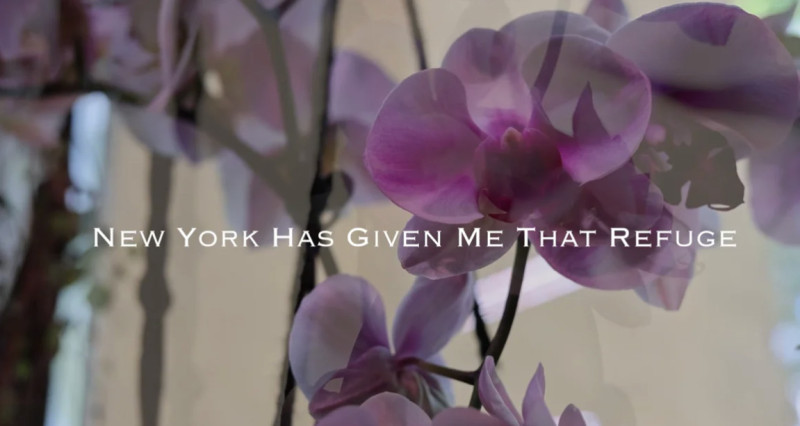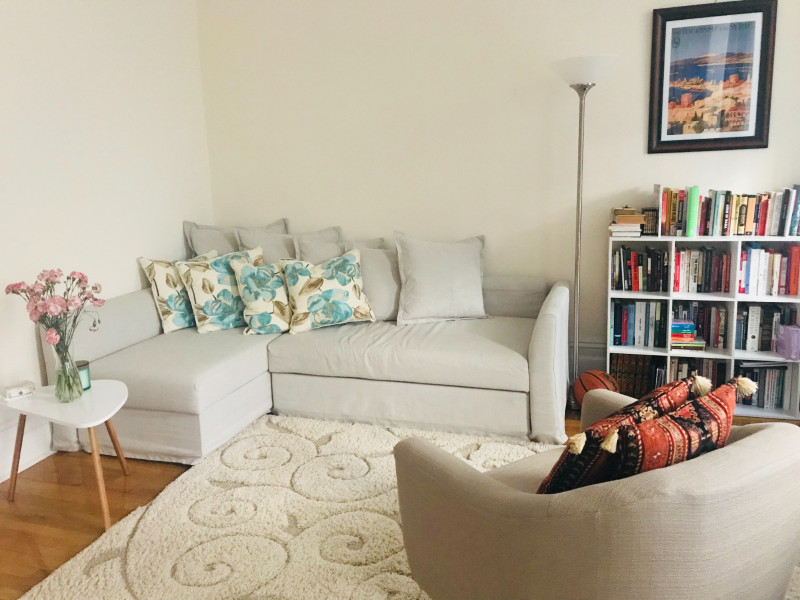
New York has given me that Refuge
In this film, refugee South Asian LGBTQ+ activist Barbara Khan talks about her migration from Pakistan and her life in New York as a trans woman.

Can you describe the stages of your way to the US? Did you have to jump through any bureaucratic hurdles? What did that process look like bureaucratically?
Practically it was super easy. I was invited by the US Ambassador to Syria at the time, or the US Envoy to Syria. I came through this program with the State Department and because I got like his recommendation, so basically I went to the embassy. I remember filling the application and they told me: You just have to go to the Embassy and do a short interview and get the visa. They told me: If they tell you “Yes”, they will just give you a time where you need to drop the passport and then pick it up for visa. And if they tell you: You need just more papers, you could work out with them. And I was like: What about if they said “No”? – we mentioned that option. And they said like: No, they would not say “No”. So, basically I remember going to the American Embassy in Cairo like someone was waiting for me at the door, walked me up into a meeting room, helped me fill the application in the papers. Everything like that… […] I mean it was a super easy process and in a way… compared to all the process I usually had to go through.
I guess you were getting from the beginning, like a taste of what American freedom might look like?
I wouldn’t say so. I mean, like more of like American wasta (transl. connection). […] But then… when I wanted to travel to the US I wasn’t here on visa. I wasn’t truly like a refugee or asylee. My process was different when I decided to apply for asylum few months after I arrived to the US.
Can you talk about that decision as well?
After spending few months in Washington, again for me realizing that there’s an opportunity to do meaningful work on Syria, there’s an opportunity to learn. I think I like the circles that I was in more than the circles that I was in when I was around Syria… […]
I mean I was always political, but I also felt like there is no point of the discussions I’m hearing, the work that I’m seeing. I mean not on the ground but on a political level for me, because my interest was in politics. So, when it came to Washington and engaged more in their conversations there, it made more sense to me than the conversations I had back in the region. So, that kind of like also helped to shape my decision, realizing that: OK, I can go back to school. […] So my idea is to stay in Washington, to settle for a little bit and then to use that as a base to kind of like go around and do the work that you do. And so that’s on one hand. On the other hand, I didn’t really feel the might of the American security agencies for me as a someone who’s a guest, or someone coming to the country. I mean, at least in the airport, wherever I go. And I didn’t really feel myself, at least at that time as a guest or as a foreigner. I think especially in Washington, it’s really easy to blend in because you have such international community there. It still took me some time to to make my decision. So, I decided after a while to apply for asylum. And that’s I guess when I started seeing more of the American bureaucracy.
Can you describe your first period in DC and its places, what were you feeling, what was going well?
I don’t know if I was focusing a lot on my feelings. I mean, at the time at least, I was more traditional than strategist. So, when I decided to stay, and that’s like right on my own, my program ended. I figured I need a place to stay. I need to find a job. I had, I think like maybe 400-500 dollars. […] So, I was making calls to find a job. You have to really work under the table until like you were able to get a work permit and all of that and I was like: What do you mean like under the table? Do you want me to wipe the ground under the table? I asked around and I was like: OK, I’ll get any cash job I get. The first one I got was a cashier in a gas station out in Fairfax. So, probably every day I will have to leave like by 5:30 AM, take the metro all the way until the end of the Orange Line and then from there bike for like 35 minutes deep into Fairfax to get there basically by 7:00 AM. I think I was paid 7 dollars an hour for the first two months and then I got promoted. I was paid 8 dollars an hour. Shortly after there was a filmmaker doing a documentary on Syria. So, they wanted a translator for a small part of the film, and I did that and then they actually wanted it like a full review of the translation plus cultural appropriations. That was kind of my real job also while I was still waiting for my work authorization. So, my first six months was more focused on surviving, I guess. In the first phase, I was focusing on making a living and I don’t need anyone basically to support my living.
What were your challenges at the time, especially when you had first arrived?
I mean definitely finding a job was one of them. I think what helped me is I wouldn’t shy away from my new job. I felt like it’s not a shame to actually work something. It’s a shame if you are like too shy to actually do something and then like you have to call and ask people for money. […]
I saw the face of the American bureaucracy after, when applying for asylum […] Everyone told me: You need to find a lawyer. And then of course if you have no money find a pro-bono lawyer. So, I found this pro-bono lawyer through a local organization in DC. I was happy to have any lawyer. I wasn’t truly aware of what the process looks like and we worked everything, drafted a statement and everything. But then after he submitted my asylum, we realized that he didn’t even review my statement. So, on one hand, you have that asylum – like application. Which is detailed, has a lot of questions…It’s not easy. […] Later I realized that this lack of real supervision from his side actually screwed my application for years to come. […] So, that was kind of a challenge at the beginning, but also continued to be a challenge for like 9 years after. […]
Also, I think something Washington was not truly helpful with is that pending asylum seekers, they really have to go through this scrutiny any time to get any papers. Pending asylum seekers in Washington DC don’t get drivers license. So, when you apply for asylum, you get a special like Social Security card with a special categorization. So, that category in Washington DC does not guarantee you a driver’s license. […] That was kind of like a continuous challenge for like at least the first 4-5 years of my life here. Because I needed to take cab everywhere or bike everywhere and at the same time I didn’t have a license. So, what I did basically is I got my international driver’s license, which was accepted for the first three months, after that, it’s really up to the discretion of the police officer if you were pulled over. I get pulled over a couple of times. Some of them would be nice, to be like: OK, sure. But others would be like: No, you’ve definitely been here for more than three months. I had to go through that and then as a result, I had a couple of tickets…it was just a financial burden then I was working I think two or three jobs at the time, so making it to the court at a specific time was just very inconvenient. So, I would basically pay the ticket which was around I think 500-600 dollars at the time.
Sami11name changed is a political activist and refugee from Syria who has been living in the US since 2011. After two detentions, Sami decided to leave Syria and fled first to Lebanon and Egypt with his family. Since September 2011, Sami has been living in Washington, D.C. in the USA.
Interview conducted by the We Refugees Archive team with Sami in the summer of 2022. The interview has been edited for length and clarity. The interviewee wished to remain anonymous, therefore we have changed his name.